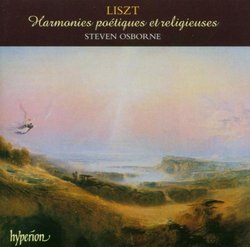| All Artists: Franz Liszt, Steven Osborne Title: Liszt: Harmonies po�tiques et religieuses Members Wishing: 1 Total Copies: 0 Label: Hyperion UK Release Date: 2/10/2004 Album Type: Import Genre: Classical Styles: Chamber Music, Forms & Genres, Suites, Historical Periods, Classical (c.1770-1830) Number of Discs: 2 SwapaCD Credits: 2 UPC: 034571174457 |
Search - Franz Liszt, Steven Osborne :: Liszt: Harmonies po�tiques et religieuses
 | Franz Liszt, Steven Osborne Liszt: Harmonies po�tiques et religieuses Genre: Classical
|
Larger Image |
CD Details |
CD ReviewsExtreme sound range Marcio | 02/04/2005 (1 out of 5 stars) "The pianist, Steven Osborne, in this recording, plays quite well, but cannot be considered a first-line Liszt player like Jorge Bolet. I compared "Benediction de Dieu dans la solitude" by Osborne or Bolet, and there is an ocean favouring the second. The major problem with this cd, though, seems to be with the sound engineering. The low parts are too low and the high ones are too high. To get a proper listening one has to adjust the volume, lowering and raising it, in different parts of the record and this, of course, spoils the enjoyment." Wonderful technique and colors, but no feeling just a guy | 03/07/2006 (3 out of 5 stars) "I picked up this disc because 1) I loved benediciton and funeralles and thought having the entire set would be a neat idea. 2) Steven Osborne did a terrific job with Messiaen's Vingt Regards. The colors are here (like in the Messiaen) - there are truly some beautiful sounds coming out of the piano. And his playing is technically flawless and clean. Too clean. The overall effect comes off with no soul or spirituality, which is not what one should do with a religous-themed work. The same approach that worked marvellously for Messiaen does not work for Liszt and Osborne fails to adapt here. Which is dissapointing -- this could have been a magical recording, instead we are left wanting more than we got." Two of the Least Inspired and Accomplished Piano Discs in Re C. Pontus T. | SE/Asia | 08/28/2008 (1 out of 5 stars) "What is a review? 'A report or essay giving a critical estimate of a work or performance', to quote the generally excellent Free Online Dictionary. Is that what you get on amazon.com? Sure, sometimes, but more often than not, no. What you get here is some kind of club of strained niceness, where the objective of too many reviewers appears to be to praise their latest CD purchases in shallow superlatives and inflated stars, in combination with rewarding fellow reviewers for doing the same.
It's probably rather obvious by now that this review has no intention of earning numerous 'helpful' votes. Let's just spell it out: This is a rather meaningless record, indeed one of the least successful in recent memory at delivering something to remember about the music--at least set against the reviews it received, not so much here (for a change--BTW, thanks for an excellent review, B. Johnson!) but rather by such so-called professional reviewers as Mr Bryce Morrison of Gramophone and Mr Jed Distler of ClassicsToday. (By the way, the very same to guys who produced dozens of jubilant Joyce Hatto reviews...) To be more concrete: Mr Osborne certainly has talent (just try his Kapustin: Piano Music). Having said that, he is likely one of the currently most overrated 'young' pianists artist in the market (especially so in the UK that certainly should come as no surprise)--recently having produced not 'one of the finest Liszt records ever' (Morrison) but rather one of the absolute worst. The only truly remarkable aspect about it is that Osborne delivers the most uninspired, unaccomplished and generally dull version of the celestial masterpiece Benediction conceivable. Not even the recorded sound warrants any merit, being unnatural both in terms of its metallic quality (similar to so many of Decca's piano reproductions) and dynamic range. On the positive side: Harmonies poetiques et religieuses is one of not only Liszt's most awe-inspiring cycles but in the whole literature of piano music. Of course, one wouldn't be able to tell from these two discs. Try instead the sadly underrated Philip Thompson on Naxos (unfortunately marred by 'clangy sonics', as Mr Distler accurately points out for a change), who at budget price outclasses this British 'star' in every single aspect of the word. If you don't believe me, check with the apparently (at least in this instance) enlightened Hexameron (Liszt: Complete Piano Music, Vol. 3, Liszt: Complete Piano Music, Vol. 4)." |

 Track Listings (5) - Disc #1
Track Listings (5) - Disc #1